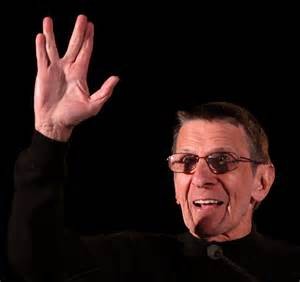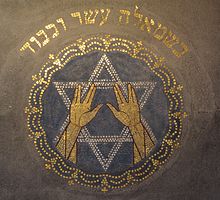Notes from the Lampert Library

 You never know when what you saw or learned as a child will resurface or in what form. Such was the case of the famous Vulcan salute popularized by Leonard Nimoy, known as Mr.Spock, on the original three season long Star Trek series which first aired in September 1966. With so many devoted Trekkies out there, Notes from the Lampert Library can’t let the passing of Star Trek’s cohain go without mention.
You never know when what you saw or learned as a child will resurface or in what form. Such was the case of the famous Vulcan salute popularized by Leonard Nimoy, known as Mr.Spock, on the original three season long Star Trek series which first aired in September 1966. With so many devoted Trekkies out there, Notes from the Lampert Library can’t let the passing of Star Trek’s cohain go without mention.
Nimoy, who died February 27, was raised in Boston, the son of Yiddish speaking immigrants from Ukraine. Nimoy was fluent in Yiddish, the language he used to speak to his grandparents. Later he used that language to record short stories from Eastern Europe for a Yiddish Book Center radio program.
In a video interview by the Yiddish Book Center, Nimoy said that his own identity had much to do with how he developed Mr. Spock’s character. Spock was an outsider, “not totally Vulcan, not totally human. Alienation”, said Nimoy, “ was something I learned in Boston, I knew what it was to be part of a minority- and in some cases- an outcast minority.”
From an early age he was interested in drama and in 1949 he went to Hollywood to pursue his acting dream. Despite a career of success in movies, in the theater and as an artist and writer, Nimoy is best remembered for the three seasons of Star Trek and the character which he created. He also directed and produced several Star Trek movies.
Other credits included the movie “Three Men and a Baby,” “A Woman Called Golda,” and several well-known voice-overs. He played Tevye in a Boston production of Fiddler on the Roof; he was a popular reader for Selected Shorts, a series of programs of recorded short stories, heard on National Public Radio; he narrated several video games and was an accomplished photographer who exhibited in well-known galleries. In addition, he authored two autobiographies: I am Not Spock and I am Spock. In the latter he finally accepted the strong identification with the Mr. Spock character and acknowledged how it influenced his life.
 Ironically he is probably best known for a small bit taken from his Jewish upbringing. When trying to make the Vulcan Spock, a hybrid alien-human, unique, Nimoy was inspired by his childhood Jewish experiences. Attending synagogue with his father, he was mesmerized by the mystery and power of dukhanen, the performance of the priestly blessing by the congregation’s cohanim.
Ironically he is probably best known for a small bit taken from his Jewish upbringing. When trying to make the Vulcan Spock, a hybrid alien-human, unique, Nimoy was inspired by his childhood Jewish experiences. Attending synagogue with his father, he was mesmerized by the mystery and power of dukhanen, the performance of the priestly blessing by the congregation’s cohanim.
He adapted the configuration of the hands and made the greeting with one hand rather than two. In fact the words of the greeting itself “Live long and prosper” are an adaptation of the words of the blessing: May Adonai bless you and guard you.  May Adonai show you favor and be gracious to you. May Adonai show you kindness and grant you peace (Sim Shalom translation).
May Adonai show you favor and be gracious to you. May Adonai show you kindness and grant you peace (Sim Shalom translation).
As a tribute to Nimoy, Terry W. Vurts, an astronaut on the International Space Station, tweeted this picture of the Vulcan Salute as the Space Station flew over Boston.
May Nimoy’s memory live long and prosper in the world of reruns.
Check out the Lampert Library’s collection for science fiction and fantasy especially among books of folklore and legends
- Is It Passover Yet? - Thu, Apr 18, 2024
- MESH Report April 9, 2024 - Thu, Apr 11, 2024
- Guess Who? - Wed, Mar 13, 2024
